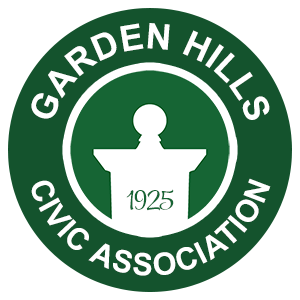There was some confusion after the last neighborhood zoning report regarding the roles of each entity in the title. Since most homes in Garden Hills predate the City Zoning Ordinance, it is not unusual for additions (and even existing structures) to be in violation of setbacks.
The very brief description below follows a typical variance application:
- City Planning Department: A variance is an application filed with the City Planning Department requesting that you be allowed to build, remodel, etc. in a manner not allowed by existing code ordinances.
- Neighborhood Zoning Committee: The next “stop” in the application process for most homeowners who are seeking a variance is to meet with the Zoning Committee. The applicant presents what they want to build and why they need a variance to this committee, together with a survey, existing site plan and a plan showing proposed construction. The applicant should have letters of support from all contiguous neighbors as well as an explanation of why the applicant feel a variance is merited. The Zoning Committee can vote to approve, approve with conditions, deny, or defer. Its decision, which is a recommendation only, is shared with NPU-B.
- NPU-B: Atlanta is divided into 25 Neighborhood Planning Units. NPU-B is made up of 14 neighborhoods, including Garden Hills, Peachtree Hills, Peachtree Heights East/West, and Peachtree Park. The application process is generally the same as the presentation made to the Zoning Committee, offering a public forum for discussion and neighborhood input with a vote following. The vote to approve, approve with conditions, deny or defer is then shared with the Board of Zoning Adjustment (BZA). Like the Zoning Committee, its decision is a recommendation only.
- Board of Zoning Adjustment (BZA): The BZA is a quasi-judicial board of five appointed members that hears applications for variances. The BZA takes into consideration the recommendations of the Office of Zoning and Development staff, the recommendation of the NPU, as well as testimony given at the hearing. A decision-making body, the BZA will then vote to approve or deny the request.
Distinct from a variance application, the Zoning Review Board (ZRB) hears rezoning requests, usually a reclassification of property to a different zoning district or the reassignment of property to different zoning restrictions. Application to rezone is much more arduous than a variance, requiring much greater detail and justification (e.g., compatibility with Comprehensive Development Plan {CDP}, effect on character of neighborhood, impact on public facilities, public notification, etc.). After going through Zoning Committee and NPU-B, the ZRB makes a recommendation to City Council who, upon review, votes to approve or deny.
Susan Bennett
Zoning Committee

